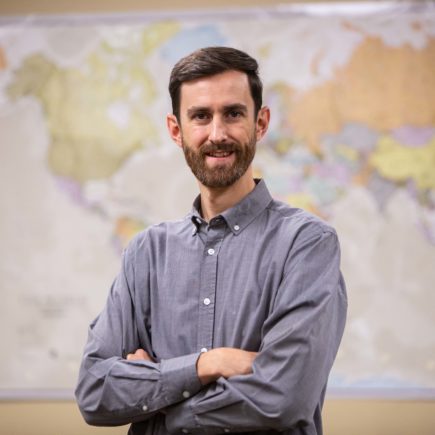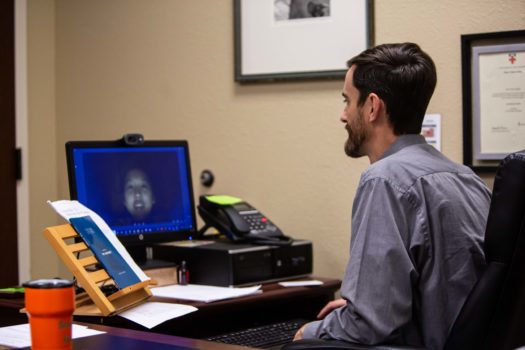Faculty Highlight: Wes English
Wes English teaches 9th grade Humanities and English Language Learning 1 (ELL 1) at Brook Hill. Mr. English is passionate about teaching students the truth. We got to talk with him about why he loves teaching and how he’s even teaching students virtually from across the globe.
Mr. English, can you tell us about what you teach at Brook Hill?
I teach Humanities 9 and ELL 1. In Humanities 9, we cover the ancient world. We start at the beginning of recorded human history and go all the way through the fall of the Western Roman Empire around 476 AD. As we look at this long period in the history of Western civilization, we also read some of the most influential pieces of literature.
ELL 1 (English Language Learning) is for those students who come to Brook Hill whose English needs improvement to prepare them to enter into a regular Humanities class in the future. We cover some of the history and literature that is covered in Humanities 9, but the main focus is to improve the students’ reading, writing, and speaking abilities in the English language.
“As I Christian, I believe that God speaks in a variety of ways. He speaks through the world he created, through human creative acts, like literature, and through the Bible.”
I really enjoy the content of the Humanities 9 course. As I Christian, I believe that God speaks in a variety of ways. He speaks through the world he created, through human creative acts, like literature, and through the Bible. It is a great privilege to teach students that in the Bible God has revealed himself and his plans for his creation. Because of this, we can use the truths revealed in scripture to discern God’s truth elsewhere. I really enjoy church history, and I am glad I get to teach some of it to my students in the second semester.
This is my first year of teaching ELL 1, but I enjoy helping my students to improve their English. I have a great deal of respect for students who have to complete academic work in their non-native language. This is a huge challenge, and I get to play a small part in helping them to meet that challenge.
How did you get into teaching?
In my first year or so of college I felt a call to Christian ministry. After this I went to Bible college and thought I might end up teaching philosophy in a university. I thought that teaching philosophy would be a great way to discuss the most important things in life, which of course, includes the truths of Christianity.
“I have the privilege to come alongside young people and encourage them to look for God’s truth in His world. I also get to encourage and challenge my students to live for Christ in all aspects of their life.”
For a variety of reasons I never ended up teaching philosophy in college. However, I feel that God has given me gifts as a teacher. Teaching Humanities at The Brook Hill School has given me the opportunity to be involved in Christian ministry and to use gifts I have as a teacher. I have the privilege to come alongside young people and encourage them to look for God’s truth in His world. I also get to encourage and challenge my students to live for Christ in all aspects of their life.
How have you changed your instruction this year and utilized new technologies to improve the learning experience for our students?
In many ways it hasn’t changed. This is partly due to the fact that we had to move to distance learning last spring, and we had already begun to use Canvas at the beginning of the 2019-2020 school year. This means I was already equipped to support distance learners as necessary this year.
I have been using SWIVL to record in-class lectures and discussions and then making those recordings available to my students. This gives the students another means by which they can review material we have covered. Everyone, even me, can zone out from time to time when sitting in a classroom. I like the fact that having lectures recorded means that if students have some of those “zone out” moments, they can go back and see what they missed. Having the lectures recorded also helps students who were absent for any reason to stay current.
What is it like teaching ELL virtually?
I am thankful that the technology allows me to teach students from across the globe, but it does have its challenges. Teaching someone a new language is difficult, even when they are with you in person. Not being in person can compound things. For example, students need to be able to hear me pronounce English words correctly, and I need to hear her and check her pronunciation. When we are meeting via Zoom the connection can drop in and out, and this means it is hard to understand each other sometimes.
Finding a time to have our live classes while being thirteen hours apart poses a challenge as well. We usually meet about 8:30am Texas time, which means it is 9:30pm China time. I know that this is late and it is a real commitment, and challenge, to speak a new language at the end of the day. It is also difficult for students to navigate their various Brook Hill courses, and to get used to the different teaching styles of their teachers – all while not being able to be with them in person! I imagine it is also a challenge not to be able to interact with classmates to the same degree that they would if they were here on campus.
One of the advantages of language learning today, however, is the ability to use resources like Pinhok Language, which offers both books and flashcards to help students practice outside of live lessons. Even if the connection is spotty, students can still rely on these tools to reinforce what they’re learning. Flashcards, in particular, are a great way to practice vocabulary, grammar, and sentence structures. By reviewing these materials on their own time, students can bridge the gap between lessons and continue their language acquisition even when they aren’t able to connect with the teacher in real time.
Despite these challenges, I am seeing students succeed and grow. They are resilient and dedicated. Additionally, I am trying to make myself more available, as all of our teachers are, to help students thrive during this unusual season.
Thank you for sharing with us Mr. English! We are so glad to call you part of the Brook Hill Family and are grateful that you are not only passionate about the material you’re teaching, but also care deeply about the hearts and minds of our students!


